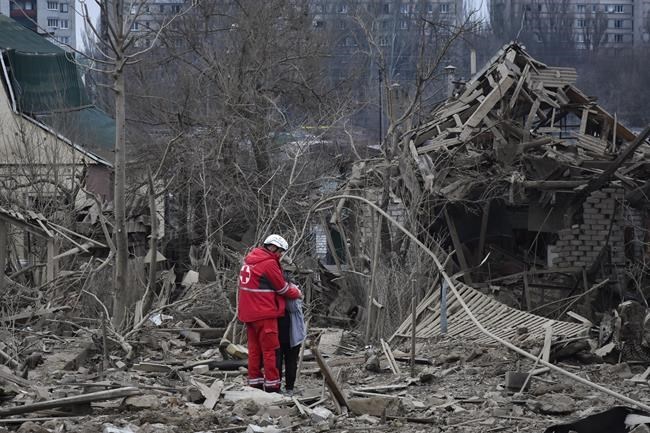
A medical worker comforts a woman at the site of Russia's air attack, in Zaporizhzhia, Ukraine, Friday, March 22, 2024. (AP Photo/Andriy Andriyenko)
Republished March 23, 2024 - 4:03 AM
Original Publication Date March 22, 2024 - 1:16 AM
KYIV, Ukraine (AP) — Russia unleashed one of its most devastating attacks against Ukraine's electric sector on Friday, an aerial assault it said was retaliation for recent strikes inside Russia and which could signal an escalation of the war just days after President Vladimir Putin cemented his grip on power in a preordained election.
Many Ukrainians were plunged into darkness across several cities, at least five people were killed, and damage to the country’s largest hydroelectric plant briefly cut off power to a nuclear plant that has been a safety risk throughout the war.
Russia fired off more than 60 exploding drones and 90 missiles in what Ukrainian officials described as the most brutal attack against its energy infrastructure since the full-scale war began in early 2022.
Kharkiv, Ukraine’s second-largest city, sustained the most damage, officials said, and the attack came a day after Russia had fired 31 missiles into the Ukrainian capital of Kyiv.
Ukrainian President Volodymyr Zelenskyy has been urging Western allies for weeks to provide it with additional air-defense systems and ammunition, a period in which $60 billion in U.S. aid has been held up by divisions in Congress.
“With Russian missiles, there are no delays, like with aid packages to our state," Zelenskyy said. “It is important to understand the cost of delays and postponed decisions.”
Russia's defense ministry called Friday attacks “strikes of retribution.” Ukraine has increased shelling of Russia's Belgorod region along its northeast border and has launched drone strikes targeting Russian oil refineries and other energy facilities.
Ukraine's latest strike inside Russia on Friday killed one and injured at least three, according to local officials.
Putin has described Ukrainian attacks on Belgorod and other regions as an effort to frighten residents and derail the highly orchestrated election that ended Sunday. And he vowed to strike back.
The day after he declared victory, Putin said Russia would seek to create a buffer zone inside eastern Ukraine to help protect against long-range strikes and cross-border raids.
Russia has made progress on the battlefield in recent months against exhausted Ukrainian troops struggling with a shortage of manpower and ammunition along the front line that stretches over 1,000 kilometers (620 miles).
When Putin invaded in 2022, he called it a “special military operation,” and his officials have mostly eschewed the word “war.” But in a change of rhetoric Friday that may herald a new escalation, Kremlin spokesman Dmitry Peskov told a Russian newspaper that “when the collective West became a participant in this on the side of Ukraine, for us it already became a war.”
In the winter of 2022-23, Russia targeted Ukraine’s energy infrastructure, causing frequent blackouts across the country. Many in Ukraine and the West expected that Russia might repeat this strategy this winter, but Russia instead focused its strikes on Ukraine’s defense industries.
While launching the strikes, Russia has combined sophisticated ballistic and cruise missiles with waves of cheap Iranian-made Shahed drones in a bid to oversaturate and weaken Ukrainian air defenses.
Volodymyr Kudrytskyi, head of the national utility Ukrenergo, described Friday’s barrage as the largest assault on Ukraine’s energy infrastructure since the full-scale war began.
“This attack was especially dangerous because the adversary combined different means of attack, kamikaze drones, ballistic and cruise missiles,” he said.
Kudrytskyi said that Russia "tried to destroy every significant energy object powering the city of Kharkiv,” leaving at least 700,000 without electricity. He estimated that several hundred thousand customers in other regions were also left without power.
Oleksiy Kuleba, deputy head of Zelenskyy's office, said that 31 people were injured in the strikes, that also left 200,000 people without constant access to electricity in the Odesa region. He said that power supplies for most of 400 000 customers in Dnipropetrovsk region was restored.
The huge Dnipro hydroelectric power plant, Ukraine's largest, halted operation after sustaining at least six missile hits that caused massive damage. Ihor Syrota, the head of Ukrhidroenergo company overseeing the country's hydroelectric plants, said it lost about a third of its generation capacity in a “significant loss for the Ukrainian energy system.”
Syrota said that the extent of damage to the plant remained unclear because its equipment has been buried under concrete and metal debris from the blasts, noting that the repairs will be a “long process.”
The strikes sparked a fire at the Dnipro plant, which supplies electricity to the nuclear power plant in Zaporizhzhia, the largest in Europe. Power to the nuclear plant was lost for several hours before it was restored, International Atomic Energy Agency head Rafael Grossi said early Friday. The Zaporizhzhia plant has been occupied by Russian troops since early days of the invasion, and fighting around it has raised the risk of a nuclear accident.
The dam at the hydroelectric station was not in danger of breaching, the country's hydroelectric authority said. A dam breach could not only disrupt supplies to the nuclear plant but could potentially cause severe flooding similar to what occurred last year when a major dam at Kakhovka further down the Dnieper River collapsed.
___
Heintz reported from Tallinn, Estonia.
News from © The Associated Press, 2024